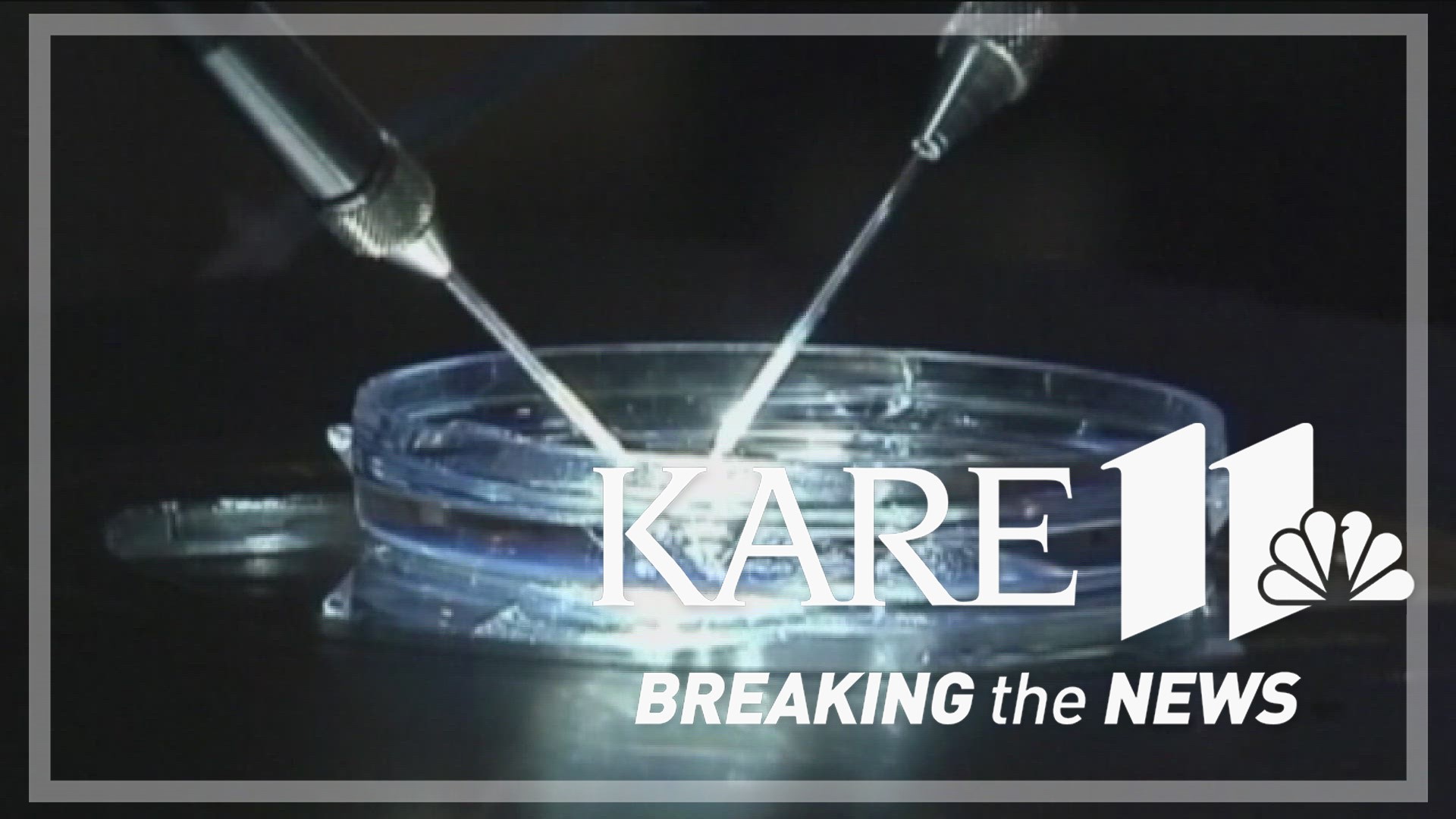MINNEAPOLIS — The largest health system in Alabama is pressing pause on in vitro fertilization (IVF) following a decision by the Alabama Supreme Court that recognizes un-implanted human embryos as children.
A spokesperson for the University of Alabama at Birmingham (UAB) health system said they are "saddened" for patients trying have children through IVF, but that the decision is due to fears of criminal prosecution and lawsuits.
On Friday, the Alabama Supreme Court ruled on appeals brought by three couples whose embryos were destroyed in 2020. The couples filed a wrongful death case after a hospital patient removed the frozen embryos from cold storage tanks and dropped them on the floor.
The court's ruling referenced the Alabama Constitution, saying that an 1872 statute allowing parents to sue over the wrongful death of a minor child applies to “unborn children,” with no exception for “extrauterine children.”
That has prompted many legal questions in Alabama and throughout the United States in the days since.
Tim Johnson, a Professor of Political Science and Law at the University of Minnesota, says the United States Supreme Court is unlikely to clear up any of those questions.
"The U.S. Supreme Court can only hear and decide cases that implicate federal law or the federal constitution," Johnson said. "So I think there's a pretty good prediction to be made that this case would not go to the US Supreme Court.
The Alabama Supreme Court has now put the court in a corner that, if it were to weigh in on this case, it would have to make some determination — most likely — about when life begins, and even as conservative as this court is today, I'm not sure the court has the where-with-all to do that at this point."
Johnson says that leaves a lot of legal uncertainty in Alabama, and in the meantime, he says he wouldn't be surprised to see other IVF providers follow the lead of the UAB system.
"I think that that is where this is going," Johnson said. "You are having lawyers huddling with doctors, who specialize in IVF, and they trying to decide what they can do, what they can't do and whether or not they can even offer IVF treatment in the State of Alabama.
The assumption is, by saying that life begins at conception, with the embryo, that would naturally lead to that next type of ruling, which could potentially — if not for sure — criminalize such actions."
Leslee Jaeger, an Ob/Gyn and Laborist in Minnesota, says there are even unanswered questions about the options patients might have beyond Alabama.
"It's not clear whether or not you can take your frozen embryos from Alabama, that you currently have, and transfer them to another state," Jaeger said. "It's not clear if you - as an individual or as an institution - could be found liable if you were to do something like that."
Jaeger, says she's saddened — but not surprised — by the ruling.
"I'm glad I live in Minnesota, where we have better protection," she said. "If you just look at the march against reproductive rights, it was kind of the next pin that was going to fall."
Those leading the march against abortion nationwide are applauding the decision. On Wednesday, Minnesota Citizens Concerned for Life sent a statement on the decision to KARE 11.
"Human embryos are what each of us once was. They are human beings at the embryonic stage of their lives, and the Alabama Supreme Court is right to recognize that they matter under the law. We all deserve protection regardless of our age or condition.
MCCL doesn't have a position on IVF as such, but we oppose the destruction of innocent human beings, including those at the embryonic stage.
(IVF can be done in a way that avoids that concern, which is why we don't take a position on it per se.)"
Whether or not IVF providers find a path forward in Alabama, Jaeger says it will almost certainly come at a much greater cost.
"In vitro fertilization has become less expensive over time because we do have the ability to safely freeze embryos so people can use them in future cycles and they don't have to go through all of the medications again," Jaeger said. "If a cycle fails, or even if a cycle works and you want a second child, you might have some embryos frozen that you can use. The problem (with this ruling) becomes, what happens if you have one or two children and you have 8-10 more embryos? That's $1,000 a year to freeze embryos. This law tells you that you can never destroy those embryos."
Despite the uncertainty that remains in Alabama, Johnson says it's likely only a matter of time before there are similar cases — and rulings — in other states, especially those that have recently passed laws stating that life begins at fertilization.

